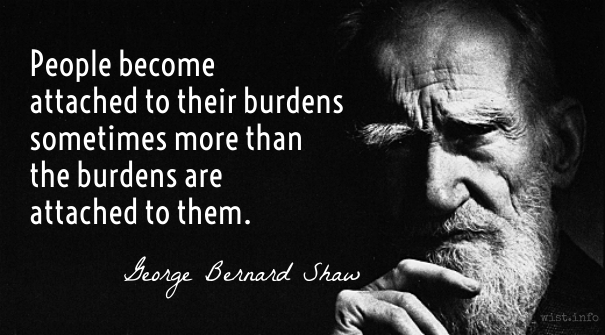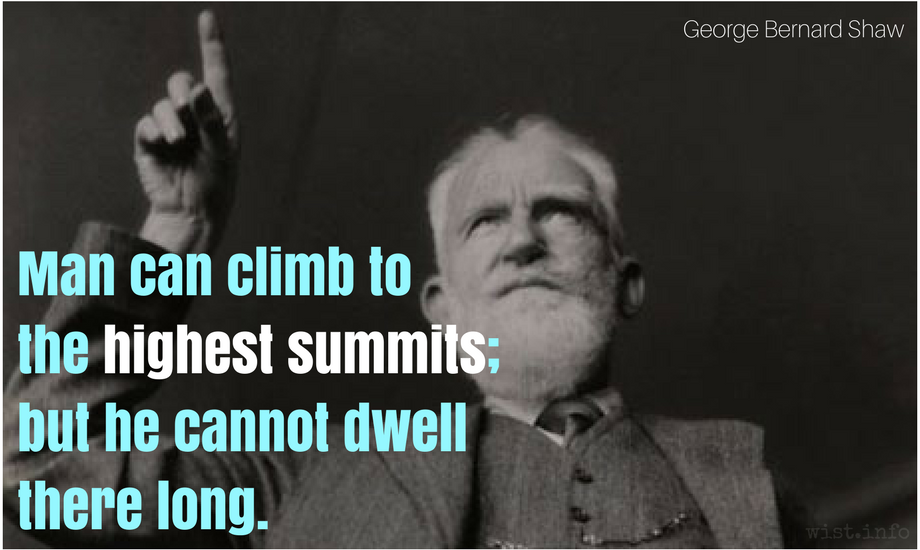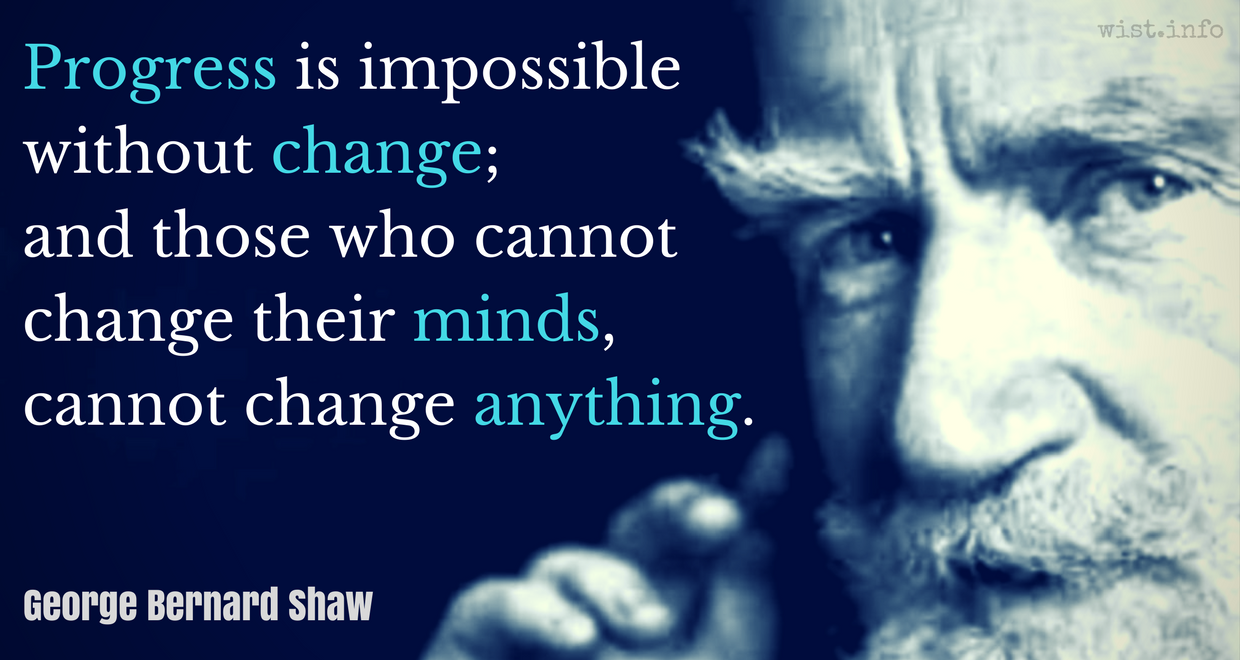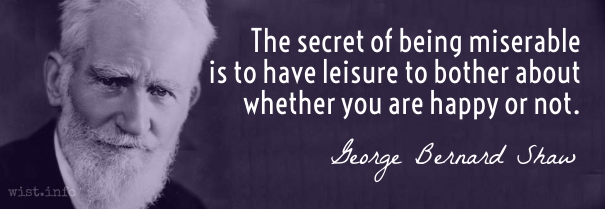I am of the opinion that my life belongs to the whole community and as I live it is my privilege to do for it whatsoever I can. I want to be thoroughly used up when I die, for the harder I work the more I live. I rejoice in life for its own sake. Life is no “brief candle” to me; it is a sort of splendid torch which I’ve got a hold of for the moment and I want to make it burn as brightly as possible before handing it on to future generations.
George Bernard Shaw (1856-1950) British playwright and critic
“Art and Public Money,” speech, Municipal Technical College and School of Art, Brighton (1907-03-06)
(Source)
This is the "official" version that shows up in Archibald Henderson, George Bernard Shaw: His Life and Works, ch. 16 (1911), as the final words. A variant version from the reporter's notes was published in the Sussex Daily News (1907-03-07):
I consider my life belongs to the whole community, and while I last it is my privilege to do what I can for it. I want to be worn out, because the harder I am working, the more I live. I enjoy like for its own sake. It is no "brief candle" for me. It is a sort of glorious torch, which I have got the hold of for the moment, and I want to make it blaze brighter before I hand it on to future generations.
For the "brief candle" reference, see Shakespeare.
This passage is sometimes quoted incorrectly preceded by a passage in the "Epistle Dedicatory to Archibald Henderson" to Man and Superman (1903). This error may have come from Stephen Covey, who identified the chimera as one of his favorite quotations.
Quotations by:
Shaw, George Bernard
It was from Handel that I learned that style consists in force of assertion. If you can say a thing with one stroke unanswerably, you have style; if not, you are at best a marchand de plasir, a decorative litterateur, or a musical confectioner, or a painter of fans with cupids and cocottes. Handel has this power. When he sets the words “Fixed in his everlasting seat,” the atheist is struck dumb; God is there, fixed in his everlasting seat by Handel, even if you live in an Avenue Paul Bert and despise such superstitions. You may despise what you like, but you cannot contradict Handel.
George Bernard Shaw (1856-1950) British playwright and critic
“Causerie on Handel in England,” Ainslee’s Magazine (May 1913)
Originally a music society lecture given in France. Longer discussion.
The moment a revolution becomes a government, it necessarily sets to work to exterminate revolutionists. … I certainly laughed at the Soviet for setting up a museum in Moscow to glorify revolution. For when the revolution triumphs, revolution becomes counter-revolution.
Democracy is a device that ensures we shall be governed no better than we deserve.
LORD NORTHCLIFFE: The trouble with you, Shaw, is that you look as if there were famine in the land.
SHAW: The trouble with you, Northcliffe, is that you look as if you were the cause of it.
Gentlemen: I shall never shave, for the same reason that I started a beard, and for the reason my father started his. I remember standing at his side, when I was five, while he was shaving for the last time. “Father,” I asked, “Why do you shave?” He stood there for a full minute and finally looked down at me. “Why the hell do I?” he said.
George Bernard Shaw (1856-1950) British playwright and critic
(Attributed)
Postcard response when invited by an electric razor company to shave off his beard with their product. Variant:
- "I was about five at the time, and I was standing at my father's knee whilst he was shaving. I said to him, 'Daddy, why do you shave?' He looked at me in silence, for a full minute, before throwing the razor out of the window, saying, 'Why the hell do I?' He never did again."
England and America are two countries separated by the same language.
George Bernard Shaw (1856-1950) British playwright and critic
(Attributed)
Variants:Possibly a misattribution from Oscar Wilde in 1887: "We have really everything in common with America nowadays, except, of course, language."
- "England and America are two peoples separated by a common language."
- "England and America are two countries separated by one language."
- "The British and the Americans are two great peoples divided by a common tongue."
One of the first attributions to Shaw, without source, was in Reader's Digest (Nov 1942). It also shows up in other articles at the time, referenced as a remark by Shaw but without any actual citation. The phrase is not found in Shaw's published writing.
For further discussion of the quote's origins: Britain and America Are Two Nations Divided by a Common Language – Quote Investigator.
The longer I live, the more I am inclined to the belief that this earth is used by other planets as a lunatic asylum.
George Bernard Shaw (1856-1950) British playwright and critic
(Attributed)
Attributed to Shaw by Judge Henry Neil in a letter (6 Sep 1919) to the Dublin Weekly Freeman. Neil said Shaw had made the statement in correspondence over pension laws for widows. While Voltaire (and others earlier) employed similar metaphors for Earth as a madhouse, this particular phrasing appears to be Shaw's.
More discussion of the quotation's origins here: This Earth Is Used By Other Planets as a Lunatic Asylum – Quote Investigator.
The problem with communication is the illusion that it has occurred.
George Bernard Shaw (1856-1950) British playwright and critic
(Spurious)
Frequently attributed, but not found in Shaw's writings. Most likely originated by William Hollingsworth Whyte, "Is Anybody Listening?" Fortune (Sep 1950). More discussion: The Biggest Problem in Communication Is the Illusion That It Has Taken Place – Quote Investigator.
Life isn’t about finding yourself. Life is about creating yourself.
George Bernard Shaw (1856-1950) British playwright and critic
(Spurious)
This aphorism is frequently attributed to Shaw, but not found in his works and not attributed to him or in this form before around 1990. It may be a misattributed paraphrase from Thomas Szasz, The Second Sin (1973): "People often say that this or that person has not yet found himself. But the self is not something one finds; it is something one creates."
The fact that a believer is happier than a sceptic is no more to the point than the fact that a drunken man is happier than a sober one. The happiness of credulity is a cheap and dangerous quality of happiness, and by no means a necessity of life.
George Bernard Shaw (1856-1950) British playwright and critic
Androcles and the Lion, Preface (1912)
(Source)
The open mind never acts: when we have done our utmost to arrive at a reasonable conclusion, we still … must close our minds for the moment with a snap, and act dogmatically on our conclusions.
All great truths begin as blasphemies.
When a thing is funny, search it carefully for a hidden truth.
George Bernard Shaw (1856-1950) British playwright and critic
Back to Methuselah: A Metabiological Pentateuch, Part V “As Far as Thought Can Reach” [The He-Ancient] (1921)
Full text.
THE SERPENT: You see things; and you say, “Why?” But I dream things that never were; and I say, “Why not?”
George Bernard Shaw (1856-1950) British playwright and critic
Back to Methuselah, 1.1 (1921)
The Serpent speaking to Eve. President John Kennedy quoted this addressing the Irish Parliament, Dublin (28 Jun. 1963). Sen. Robert Kennedy modified it for his campaign, as used by Sen. Edward Kennedy in his eulogy (1968): "Some men see things as they are and say, why; I dream things that never were and say, why not.”
Without art, the crudeness of reality would make the world unbearable.
George Bernard Shaw (1856-1950) British playwright and critic
Back to Methuselah, Part 5 (1921)
(Source)
Life is not meant to be easy, my child; but take courage — it can be delightful.
George Bernard Shaw (1856-1950) British playwright and critic
Back to Methuselah, Part 5 [The He-Ancient] (1921)
(Source)
Ye poor posterity, think not that ye are the first. Other fools before ye have seen the sun rise and set, and the moon change her shape and her hour. As they were so ye are; and yet not so great; for the pyramids my people built stand to this day; whilst the dustheaps on which ye slave, and which ye call empires, scatter in the wind even as ye pile your dead sons’ bodies on them to make yet more dust.
It is no use my liking or disliking; I do what must be done, and have no time to attend myself. That is not happiness, but it is greatness.
George Bernard Shaw (1856-1950) British playwright and critic
Caesar and Cleopatra, Act IV [Cleopatra] (1898)
Full text. An variation on this is frequently quoted, but I haven't been able to find a source: "Forget about likes and dislikes. They are of no consequence. Just do what must be done. This may not be happiness, but it is greatness."
The more ignorant men are, the more convinced are they that their little parish and their little chapel is an apex to which civilization and philosophy has painfully struggled up the pyramid of time from a desert of savagery.
The period of time covered by history is far too short to allow of any perceptible progress in the the popular sense of Evolution of the Human Species. The notion that there has been any such Progress since Caesar’s time (less than 20 centuries ago) is too absurd for discussion. All the savagery, barbarism, dark ages and the rest of it of which we have any record as existing in the past exists at the present moment.
Man can climb to the highest summits; but he cannot dwell there long.
Progress is impossible without change; and those who cannot change their minds, cannot change anything.
George Bernard Shaw (1856-1950) British playwright and critic
Everybody’s Political What’s What? (1950 ed.)
(Source)
The man of business goes on Sunday to the church with the regularity of the village blacksmith, there to renounce and abjure before his God the line of conduct which he intends to pursue with all his might during the following week.
George Bernard Shaw (1856-1950) British playwright and critic
Fabian Essays in Socialism, “The Basis of Socialism: Economic” (1889)
(Source)
FANNY: It’s all that the young can do for the old, to shock them and keep them up to date.
When two people are under the influence of the most violent, most insane, most delusive and most transient of passions, they are required to swear that they will remain in that excited, abnormal and exhausting condition until death do them part.
George Bernard Shaw (1856-1950) British playwright and critic
Getting Married, Preface (1908)
Full text.
We always hesitate to treat a dangerously good man as a lunatic because he may turn out to be a prophet in the true sense: that is, a man of exceptional sanity who is in the right when we are in the wrong.
I did not let the fear of death govern my life, and my reward was, I had my life. You are going to let the fear of poverty govern your life; and your reward will be that you will eat, but you will not live.
George Bernard Shaw (1856-1950) British playwright and critic
Heartbreak House, Act 2 [Capt. Shotover] (1919)
In context.
I am, and have always been, and shall now always be, a revolutionary writer, because our laws make law impossible; our liberties destroy all freedom; our property is organized robbery; our morality is an impudent hypocrisy; our wisdom is administered by inexperienced or mal-experienced dupes; our power is wielded by cowards and weaklings; and our honor false in all its points. I am an enemy of the existing order for good reasons.
Nothing ever is done in this world until men are prepared to kill one another if it is not done.
George Bernard Shaw (1856-1950) British playwright and critic
Major Barbara, Act III [Undershaft] (1905)
Full text.
This is the true joy in life, the being used up for a purpose recognized by yourself as a mighty one; the being thoroughly worn out before you are thrown on the scrap heap; the being a force of Nature instead of a feverish selfish little clod of ailments and grievances complaining that the world will not devote itself to making you happy.
George Bernard Shaw (1856-1950) British playwright and critic
Man and Superman, “Epistle Dedicatory” (1903)
(Source)
The man with toothache thinks everyone happy whose teeth are sound. The poverty stricken man makes the same mistake about the rich man,
George Bernard Shaw (1856-1950) British playwright and critic
Man and Superman, “Maxims for Revolutionists,” “Beauty and Happiness, Art and Riches” (1903)
Full text.
When a man wants to murder a tiger he calls it sport; when a tiger wants to murder him he calls it ferocity.
George Bernard Shaw (1856-1950) British playwright and critic
Man and Superman, “Maxims for Revolutionists,” “Crime and Punishment” (1903)
Full text.
Democracy substitutes election by the incompetent many for appointment by the corrupt few.
George Bernard Shaw (1856-1950) British playwright and critic
Man and Superman, “Maxims for Revolutionists,” “Democracy” (1903)
(Source)
Every fool believes what his teachers tell him, and calls his credulity science or morality as confidently as his father called it divine revelation.
George Bernard Shaw (1856-1950) British playwright and critic
Man and Superman, “Maxims for Revolutionists,” “Education” (1903)
Full text.
He who can, does. He who cannot, teaches.
George Bernard Shaw (1856-1950) British playwright and critic
Man and Superman, “Maxims for Revolutionists,” “Education” (1903)
(Source)
The savage bows down to idols of wood and stone: the civilized man to idols of flesh and blood.
George Bernard Shaw (1856-1950) British playwright and critic
Man and Superman, “Maxims for Revolutionists,” “Idolatry” (1903)
Full text.
The reasonable man adapts himself to the world: the unreasonable one persists in trying to adapt the world to himself. Therefore all progress depends on the unreasonable man.
George Bernard Shaw (1856-1950) British playwright and critic
Man and Superman, “Maxims for Revolutionists,” “Reason” (1903)
Full text.
If you begin by sacrificing yourself to those you love, you will end by hating those to whom you have sacrificed yourself.
George Bernard Shaw (1856-1950) British playwright and critic
Man and Superman, “Maxims for Revolutionists,” “Self-Sacrifice” (1903)
Full text.
Liberty means responsibility. That is why most men dread it.
George Bernard Shaw (1856-1950) British playwright and critic
Man and Superman, “Maxims for Revolutionists: Liberty and Equality” (1903)
Full text.
The man who listens to Reason is lost: Reason enslaves all whose minds are not strong enough to master her.
George Bernard Shaw (1856-1950) British playwright and critic
Man and Superman, “The Revolutionist’s Handbook,” “Reason” (1903)
Full text.
What a man believes may be ascertained, not from his creed, but from the assumptions on which habitually acts.
George Bernard Shaw (1856-1950) British playwright and critic
Man and Superman, “The Revolutionist’s Handbook,” “Religion” (1903)
(Source)
TANNER: The true artist will let his wife starve, his children go barefoot, his mother drudge for his living at seventy, sooner than work at anything but his art.
George Bernard Shaw (1856-1950) British playwright and critic
Man and Superman, Act 1 (1903)
(Source)
TANNER: Of all human struggles there is none so treacherous and remorseless as the struggle between the artist man and the mother woman. Which shall use up the other? That is the issue between them. And it is all the deadlier because, in your romanticist cant, they love one another.
OCTAVIUS: Even if it were so — and I don’t admit it for a moment — it is out of the deadliest struggles that we get the noblest characters.
TANNER: Remember that the next time you meet a grizzly bear or a Bengal tiger, Tavy.
OCTAVIUS: I meant where there is love, Jack.
TANNER: Oh, the tiger will love you. There is no love sincerer than the love of food. I think Ann loves you that way: she patted your cheek as if it were a nicely underdone chop.George Bernard Shaw (1856-1950) British playwright and critic
Man and Superman, Act 1, l. 184-188 (1903)
(Source)
Often just the "There is no love sincerer than the love of food" portion is quoted.
There are two tragedies in life. One is not to get your heart’s desire. The other is to get it.
George Bernard Shaw (1856-1950) British playwright and critic
Man and Superman, Act 4 [Mendoza] (1903)
(Source)
See Wilde, eleven years earlier. More discussion quote: There Are Only Two Tragedies. One Is Not Getting What One Wants, and the Other Is Getting It – Quote Investigator.
It is very easy for you to call me a happy man: you are only a spectator. I am one of the principals; and I know better.
George Bernard Shaw (1856-1950) British playwright and critic
Man and Superman, Act 4 [Tanner] (1903)
(Source)
The only man who behaved sensibly was my tailor; he took my measurement anew every time he saw me, while all the rest went on with their old measurements and expected them to fit me.
George Bernard Shaw (1856-1950) British playwright and critic
Man and Superman, Act I [Tanner] (1903)
Full text.
I had become a new person; and those who knew the old person laughed at me. The only man who behaved sensibly was my tailor: he took my measure anew every time he saw me, whilst all the rest went in with their old measurements and expected them to fit me.
NAPOLEON: There is nothing so bad or so good that you will not find an Englishman doing it; but you will never find an Englishman in the wrong. He does everything on principle. He fights you on patriotic principles; he robs you on business principles; he enslaves you on imperial principles.
People are always blaming their circumstances for what they are. I don’t believe in circumstances. The people who get on in this world are the people who get up and look for the circumstances they want, and, if they can’t find them, make them.
People are always blaming their circumstances for what they are. I don’t believe in circumstances. The people who get on in this world are the people who get up and look for the circumstances they want, and, if they do not find them, make them.
All censorships exist to prevent any one from challenging current conceptions and existing institutions. All progress is initiated by challenging current conceptions, and executed by supplanting existing institutions. Consequently the first condition of progress is the removal of censorships.
George Bernard Shaw (1856-1950) British playwright and critic
Mrs. Warren’s Profession, Preface (1893)
(Source)
You’ll never have a quiet world till you knock the patriotism out of the human race.
There is only one religion, though there are a hundred versions of it.
George Bernard Shaw (1856-1950) British playwright and critic
Plays: Pleasant and Unpleasant, Vol. II, Preface (1898)
Full text.
There is nothing for us but to make it a point of honor to privilege heresy to the last bearable degree on the simple ground that all evolution in thought and conduct must at first appear as heresy and misconduct.
THE INQUISITOR: Heresy begins with people who are to all appearances better than their neighbors. A gentle and pious girl or a young man, who has obeyed the command of our Lord by giving all this riches to the poor and putting on the garb of poverty, the life of austerity, and the rule of humility and charity, may be the founder of a heresy that will wreck both Church and Empire if not ruthlessly stamped out in time.
ANDERSON: My dear: in this world there is always danger for those who are afraid of it. There’s a danger that the house will catch fire in the night; but we shan’t sleep any the less soundly for that.
George Bernard Shaw (1856-1950) British playwright and critic
The Devil’s Disciple, Act II (1897)
Full text.
Life does not cease to be funny when people die any more than it ceases to be serious when people laugh.
George Bernard Shaw (1856-1950) British playwright and critic
The Doctor’s Dilemma, Act 5 [Ridgeon] (1906)
(Source)
There is no belief, however grotesque and even villainous, that cannot be made a part of human nature if it is inculcated in childhood and not contradicted in the child’s hearing.
George Bernard Shaw (1856-1950) British playwright and critic
The Intelligent Woman’s Guide to Socialism, Capitalism, Sovietism and Fascism, ch. 18 (1928)
See Schopenhauer.
We are told that the love of money is the root of all evil; but money itself is one of the most useful contrivances ever invented: it is not its fault that some people are foolish or miserly enough to be fonder of it than of their own souls.
George Bernard Shaw (1856-1950) British playwright and critic
The Intelligent Woman’s Guide to Socialism, Capitalism, Sovietism and Fascism, ch. 6 (1928)
The believers and unbelievers who think for themselves will let themselves be burnt alive rather than conform to a creed imposed on them by any power except their own consciences.
Capitalism justified itself and was adopted as an economic principle on the express ground that it provides selfish motives for doing good, and that human beings will do nothing except for selfish motives.
Better keep yourself clean and bright: you are the window through which you must see the world.
George Bernard Shaw (1856-1950) British playwright and critic
The Revolutionist’s Handbook, “Honor” (1905)
(Source)
Assassination is the extreme form of censorship.
George Bernard Shaw (1856-1950) British playwright and critic
The Shewing-up of Blanco Posnet, “The Rejected Statement, Part 1,” “The Limits to Toleration” (1909)
(Source)
THE SERGEANT: When men and women pick one another up for just a bit of fun, they find they’ve picked up more than they bargained for, because men and women have a top story as well as a ground floor, and you can’t have the one without the other.
George Bernard Shaw (1856-1950) British playwright and critic
Too True to Be Good, Act 3 (1932)
(Source)
Dying is a troublesome business: there is pain to be suffered, and it wrings one’s heart; but death is a splendid thing — a warfare accomplished, a beginning all over again, a triumph. You can always see that in their faces. And come and close my eyes too, when I die; and see me as I really was.
George Bernard Shaw (1856-1950) British playwright and critic
Letter to Edith Lyttelton (5 Jul 1913)
(Source)
Sent on the death of her husband.
I dread success. To have succeeded is to have finished one’s business on earth, like the male spider, who is killed by the female the moment he has succeeded in his courtship. I like a state of continual becoming, with a goal in front and not behind.
I have regarded you, not as a novelist, but as an historian; for it is my considered opinion, unshaken at 85, that records of fact are not history. They are only annals, which cannot become historical until the artist-poet-philosopher rescues them from the unintelligible chaos of their actual occurrence and arranges them in works of art.
When people ask me what has happened in my long lifetime I do not refer them to the newspaper files and to the authorities, but to your novels. They object that the people in your books never existed; that their deeds were never done and their sayings never uttered. I assure them that they were, except that Upton Sinclair individualized and expressed them better than they could have done, and arranged their experiences, which as they actually occurred were as unintelligible as pied type, in significant and intelligible order.
If you want to tell people the truth, you’d better make them laugh or they’ll kill you.
George Bernard Shaw (1856-1950) British playwright and critic
Quoted in “Ideas on Film,” Saturday Review (1951)
The line has been used by (and so misattributed to) Billy Wilder, Charles Ludlam, Richard Pryor, Dustin Hoffman, and James L. Brooks. It is sometimes misattributed to Oscar Wilde, though he'd been dead fifty years before its first recorded appearance.
Variants:More discussion on this quotation and some of its predecessors: If You Want To Tell People the Truth, You’d Better Make Them Laugh or They’ll Kill You – Quote Investigator.
- If you’re going to tell people the truth, be funny or they’ll kill you.
- If you want to tell people the truth, make them laugh, otherwise they’ll kill you.
The savage bows down to idols of wood and stone: the civilized man, to idols of flesh and blood.







